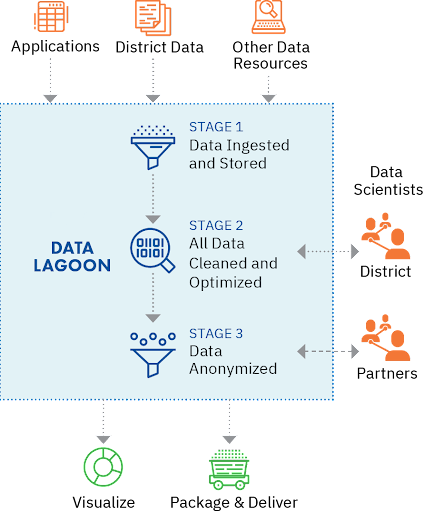Data Privacy
Student data privacy is a legal right. Quality education is a fundamental right. Education improves through responsible research, evaluation, and development that securely analyzes representative student data that captures a holistic picture of learning. The goals of keeping student records private and making data available to advance education research and development seem to be at odds, but recent legal and technical advancements have made both possible.
Legal Advancements
The Lastinger Center led the development of a new template for data sharing agreements that can be used to share data safely, securely and effectively among partners. We involved expert legal counsel to help synthesize hundreds of data sharing agreements that we have encountered as our work scaled. The result is an agreement template that the Center can use with its partners from school districts to technology partners to ensure the appropriate legal protections and guidelines are in place as data is shared between partners, setting a benchmark for how to responsibly use education data. The template is called the Guidance and Agreement for Data harmony, Responsibility, Retention, and Sharing (abbreviated GADRRS and pronounced “Gators”).
Our Approach
As a steward of education data, the Lastinger Center maintains learner data according to the legal standards of the US and Florida, using the secure enterprise data systems of the University of Florida. The data we collect and analyze for the services we provide to schools and districts is only accessed by researchers who are highly trained in data privacy and who have a direct role in analyzing the data. To accelerate research and development, we use secure processes to de-identify data, protecting individual identities, so researchers who are bound by data security standards can access specific limited datasets in a separate data system to analyze it. After student data are matched to teacher data, both student data and teacher data are irreversibly de-identified before a researcher may analyze it.

Technical Advancements
The Lastinger Center has adopted a new, highly secure, robustly tested, and widely adopted data architecture. Uniting data from the Center’s programs, state assessment data, and related data, our data infrastructure will bolster data-driven decision-making.
The Data Lagoon ties teacher professional development efforts to student academic outcomes, creating broadly sharable access to data sets with the potential to revolutionize student achievement patterns. Leveraging longitudinal data from both teacher and student learning collected through Lastinger’s programs for teachers and students on proprietary online learning platforms, we can support quick identification of high leverage areas for teacher professional development as well as classroom instruction to ultimately benefit student academic achievement.
It is situated to uncover insights into teacher professional development efforts with student academic achievement over time, and to correlate these two factors at national and local scales.
Benefits
Securing and selectively sharing de-identified data that cuts across teacher and student data sources benefits many education communities:
- Benefits to Students and Parents: Analyses of educator and student engagement with Lastinger Center programs, and the impact such engagement has on educator and student outcomes, will support continued development of programs and products that support teacher effectiveness and student success.
- Benefits to Districts: Results of such analyses will provide valuable insights to district and school officials about the types of skills and environments that are most likely to produce higher levels of teacher satisfaction and effectiveness, as well as student success and educational attainment.
- Benefits to Other Education Providers (e.g., curriculum, professional learning): Aggregate results of studies of efficacy and impact of education programs disseminated to the education research and practice community provide insights to inform education decisions and program designs.
- Benefits to the Broader Research Field: Researchers can evaluate the effectiveness of education programs to ensure public investment goes toward programs that work.
How did the Data Lagoon start?
Read more about the decision to pursue the Data Lagoon and the goals of Version 1 of this data architecture.
